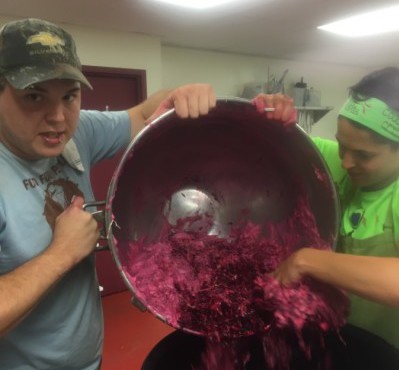[left] [/left][right]It is raw. It is alive. It is crunchy. It is tasty. Fermented foods will alter what bacteria grows in your gut. Our gut microbiome is either contributing to our health or dysbiosis is promoting disease.
[/left][right]It is raw. It is alive. It is crunchy. It is tasty. Fermented foods will alter what bacteria grows in your gut. Our gut microbiome is either contributing to our health or dysbiosis is promoting disease.
The aim is diversity and to increase the colonization of good strains such as Lactobacillus and Bifidobacterium and reduce the colonization of bad strains.[/right]
The number of microorganism in the human body is estimated to be about 100 trillion which exceeds the number of human cells in our body. Evolutionally we have adapted and they are essential for our vitality.
What causes our gastrointestinal microflora to become unbalanced? Lifestyle choices (stress and alcohol) and the Standard American Diet comprised of high sugar, processed, and refined foods that lack fiber from fresh fruits and vegetables are to blame. Further damage is done by medications such as antibiotics, birth control pills, anti-acids, and immunosuppressants.
Adding fermented foods to your diet is a simple nutritional change that will improve your digestion and health. Yogurt, miso, kvass, kombucha, kefir, sauerkraut, tempeh, and kimchi are examples of traditional fermented food common to various cultures. Sure you can take a daily probiotic capsule (and I’m thrilled to recommend one specific for you) or you can eat sauerkraut from Sweet Farm, a family farm located in Frederick, Md.
Rachel Armistead and Luke Flessner transformed their hobby into a thriving local business. I have been a fan of their kraut from my first taste. Coincidently we met at the West Frederick Farmers’ Market, soon after I learned the Lactobacillus fermentation process in a whole foods cooking lab taught by Monica Corrado, a traditional food chef. Rachel was gracious to let me observe how a batch of beet kraut is made.
A batch is about 300 pounds of organic cabbage, beets, and sea salt. Their commercial equipment is scaled larger then what we have in our homes. I saw an amazing peeler machine by Univex that washed and peeled the beets. The scrapes from the vegetables will be either composted at Sweet Farm or fed to the happy pigs at Full Cellar Farm.
 The beets are shredded and the cabbage thinly sliced, then added to the mixer with sea salt. Filtered water is added as needed. Beautiful purple foam appeared in the mixer, formed from the beet sugars and oxygen in the air. I was surprised it quickly dissipated in the fermentation tank.
The beets are shredded and the cabbage thinly sliced, then added to the mixer with sea salt. Filtered water is added as needed. Beautiful purple foam appeared in the mixer, formed from the beet sugars and oxygen in the air. I was surprised it quickly dissipated in the fermentation tank.
The kraut is covered with a glass weight to keep the vegetables submerged in the brine and eliminate exposure to oxygen. Initially the pH of the sauerkraut is 6.5 or almost neutral. Within a week the pH will quickly drop to 3.5 – acidic. The tank lid has an air lock to release the CO2 formed, similar to what is used in beer making. The fermentation process will be complete in 8 weeks at which the pH will have further dropped to mid to high 2s. The final step is manually filling the jars and delivering to the fine stores and restaurants in the DC metro area to be purchased by their growing customer base.
My favorites are the curry kraut and garlic relish although Rachel mentioned that the Old Bay is gaining popularity over classic kraut. Soon they will have pickles on a stick and in a jar and soda dispensed from a keg. Yum!
To learn more about Sweet Farm or where to purchase their products visit their website or visit their booth at the West Frederick Farmers’ Market, which runs every Saturday from 10am – 1pm. You may even see the new custom designed kraut truck by Luke.
To discover how to rebalance your gut microbiome with fermented foods and probiotics jump over to my nutrition consults page and let’s set up a time to chat.
